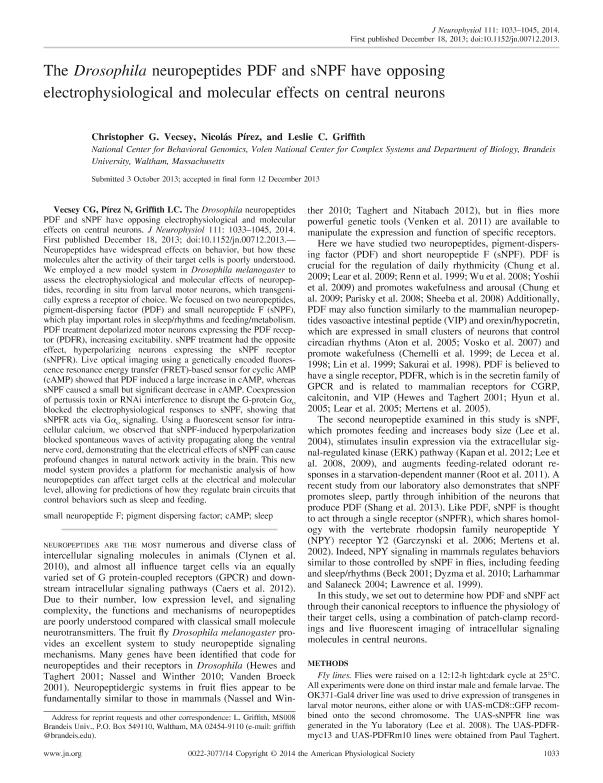Artículo
The Drosophila Neuropeptides PDF and sNPF Have Opposing Electrophysiological and Molecular Effects on Central Neurons
Fecha de publicación:
03/2014
Editorial:
American Physiological Society
Revista:
Journal Of Neurophysiology
ISSN:
0022-3077
Idioma:
Inglés
Tipo de recurso:
Artículo publicado
Clasificación temática:
Resumen
Neuropeptides have widespread effects on behavior, but how these molecules alter the activity of their target cells is poorly understood. We employed a new model system in Drosophila melanogaster to assess the electrophysiological and molecular effects of neuropeptides, recording in situ from larval motor neurons, which transgenically express a receptor of choice. We focused on two neuropeptides, pigment-dispersing factor (PDF) and small neuropeptide F (sNPF), which play important roles in sleep/rhythms and feeding/metabolism. PDF treatment depolarized motor neurons expressing the PDF receptor (PDFR), increasing excitability. sNPF treatment had the opposite effect, hyperpolarizing neurons expressing the sNPF receptor (sNPFR). Live optical imaging using a genetically encoded fluorescence resonance energy transfer (FRET)-based sensor for cyclic AMP (cAMP) showed that PDF induced a large increase in cAMP, whereas sNPF caused a small but significant decrease in cAMP. Coexpression of pertussis toxin or RNAi interference to disrupt the G-protein Gαo blocked the electrophysiological responses to sNPF, showing that sNPFR acts via Gαo signaling. Using a fluorescent sensor for intracellular calcium, we observed that sNPF-induced hyperpolarization blocked spontaneous waves of activity propagating along the ventral nerve cord, demonstrating that the electrical effects of sNPF can cause profound changes in natural network activity in the brain. This new model system provides a platform for mechanistic analysis of how neuropeptides can affect target cells at the electrical and molecular level, allowing for predictions of how they regulate brain circuits that control behaviors such as sleep and feeding.
Palabras clave:
Camp
,
Pigment Dispersing Factor
,
Sleep
,
Small Neuropeptide F
Archivos asociados
Licencia
Identificadores
Colecciones
Articulos(IIBBA)
Articulos de INST.DE INVEST.BIOQUIMICAS DE BS.AS(I)
Articulos de INST.DE INVEST.BIOQUIMICAS DE BS.AS(I)
Citación
Pírez, Nicolas; Vecsey, Christopher G.; Griffith, Leslie C.; The Drosophila Neuropeptides PDF and sNPF Have Opposing Electrophysiological and Molecular Effects on Central Neurons; American Physiological Society; Journal Of Neurophysiology; 111; 5; 3-2014; 1033-1045
Compartir
Altmétricas




